- 1. Units
- 2. Dimensions
- 3. Error
- 4. Rest and Motion
- 5. Motion Under Gravity
- 6. Rectilinear Motion Cases
- 7. Displacement, Velocity & Acceleration Graph
- 8. Relative Velocity
- 9. Projectile Motion
- 10. Force and its Type
- 11. Laws of Motion
- 12. Pulley Block System
- 13. Friction
- 14. Circular Motion
- 15. Circular Turning on Roads
- 16. Motorcycle on a Curved Path
- 17. Work, Power, Energy
- 18. Vertical Circular Motion
- 19. Centre of Mass of Some Common System
- 20. Spring Force
- 21. Impulse and Momentum
- 22. Angular Momentum
- 23. Gravitation
- 24. Elasticity
- 25. Fluid Mechanics
- 26. Radiation Conduction
- 27. The Gas Laws
- 28. Simple Harmonic Motion
- 29. Wave
- 30. Superposition and Standing Waves
- 31. Sound Wave
- 32. Doppler Effect
- 33. Electric Field
- 34. Electric Flux
- 35. Capacitor
- 36. Circuit Solution
- 37. Resistance
- 38. Grouping of Cells
- 39. Cells and Electric Power
- 40. Instruments Measuring Various Electrical Quantities
- 41. Magnetic Field
- 42. Magnetic Property
- 43. Self Induction
- 44. Alternating Current
- 45. Mirrors
- 46. Wave Optics
- 47. Photoelectric Effect
- 48. History of Atomic Model
- 49. Nuclear Physics
- 50. Semiconductor
Considering the large amount of material that needs to be remembered and the formulas and concepts that need to be solved instantly, flashcards for JEE have become really effective.
Flashcards help you break out information into smaller bits that are far easier to manage. They work wonders when it comes to revising salient ideas and even memorising and reinforcing difficult concepts. In either physical or digital form, JEE flashcards give you a structured way of learning, easing the process of memorising vital information for the JEE exam.
Key Features of JEE Flashcards PDF
Below are the highlights of the JEE flashcards PDF:
- Structured and Organised: Our PDF flashcards for JEE are organised in a subject-wise manner and further in a topic-wise manner, giving it a systematic structure to easily navigate through various flashcards.
- Based on the Latest JEE Syllabus: The subject experts at Selfstudys thoroughly study the latest JEE Syllabus and then create the JEE flashcards PDF.
- Short and Crisp: Since the flashcards are designed to break down a huge amount of information into smaller bits, the JEE flashcards are short and crisp. Our designer and subject expert team ensures that information is included in fewer words and that it is made more visual to aid in memorisation.
- Available to Download for Free: For convenience, we make it available in PDF so that you can easily download them on your smartphone and carry them with you.
- Visual Aids: Various visual elements are used to create the flashcards for JEE in PDF, such as diagrams, illustrations, colourful images, and colour-coding to highlight the important topics. Combining these visual elements boosts memory retention.
Subject-Wise Flashcards for JEE
To utilise JEE flashcards to the fullest, you are required to use them subject-wise. Our subject experts team have spent hours creating subject-wise flashcards for JEE, which includes Physics, Chemistry, and Mathematics. You can download the JEE flashcards PDF for free from the links provided.
The following sections contain crucial information about the subject-wise JEE flashcards, which you should know before you use them.
JEE Physics Flashcards PDF
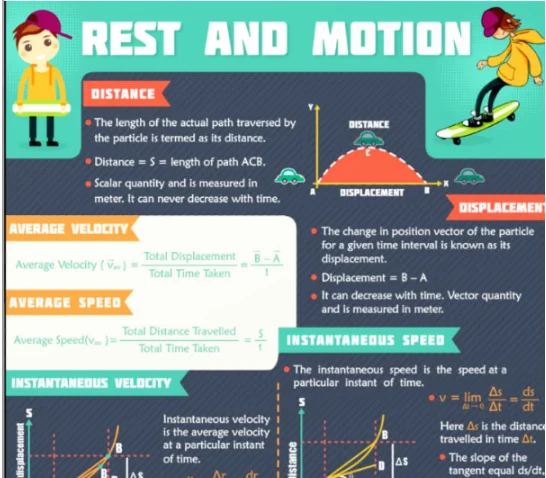
JEE Physics consists of an enormous number of formulas, theories, and concepts. There are 50 Physics topics you need to master to score higher in the JEE entrance test. Therefore, our flashcards for JEE include a variety of illustrations, mnemonics, examples, and diagrams to help you easily memorise them.
Following are the JEE Physics important formulas & concepts you need to master:
- Mechanics: Newton's laws of motion, kinematics equations, work-energy theorem, conservation of momentum.
- Electromagnetism: Maxwell's equations, Faraday's law, Lenz's law, Biot-Savart law.
- Thermodynamics: Laws of thermodynamics, Carnot cycle, entropy calculations, heat transfer formulas.
- Optics and Modern Physics: Laws of reflection and refraction, Young's double-slit experiment, photoelectric effect, atomic models.
JEE Chemistry Flashcards PDF
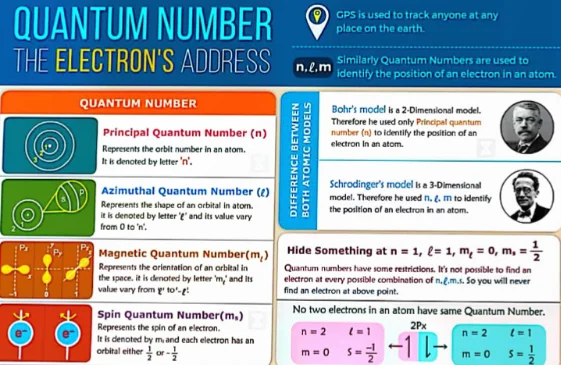
JEE Chemistry is segregated into three broad sections: Organic, Inorganic & Physical Chemistry. About 45 topics are in JEE Chemistry. You need to cover all those sections and topics to perform better in the upcoming entrance exam for JEE.
Here are the important JEE Chemistry formulas & concepts you need to cover from each Chemistry section:
| Chemistry Sections |
Important Topics & Concepts |
|---|---|
|
Organic Chemistry |
|
|
Inorganic Chemistry |
|
|
Physical Chemistry |
|
To cover all of the above topics you can use the JEE flashcards for Chemistry PDF.
JEE Mathematics Flashcards PDF
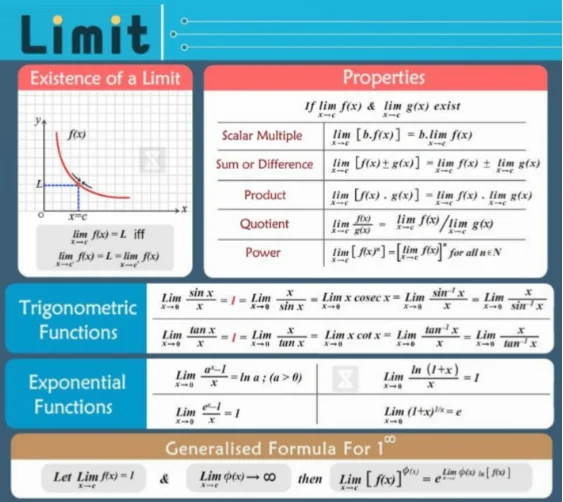
Mathematics is all about speed and precision. Flashcards for JEE Mathematics PDF can help you remember a plethora of formulas, concepts and methods. There are 35+ Maths topics you need to cover for JEE mains, and including the flashcards for regular revision can help you retain what you have learned from those topics for longer.
Meanwhile, let’s learn about the JEE Mathematics important formulas & concepts:
- Algebra:
- Binomial theorem and its expansions.
- Quadratic equations and their solutions.
- Matrices and determinants (Inverse, Cramer's rule).
- Calculus:
- Differentiation and integration formulas.
- Limits, continuity, and L'Hôpital's rule (aka. Bernoulli's rule).
- Applications of derivatives (Maxima, minima, tangent & normal).
- Coordinate Geometry:
- Equations of conic sections (Circle, Parabola, Ellipse, Hyperbola).
- Distance formula, slope, and section formula.
- Probability
What is The Process for Getting the JEE Flashcards PDF Free Download from SelfStudys?
In this section, we have described the entire process that will help you reach the web page where JEE flashcards PDF free download is available.
- Type www.selfstudys.com directly in the search section of your favorite web browser.

- On the homepage, your first click should be on the ‘Navigation’ tab.
- Now, our main menu will be displayed from where you have to select the ‘JEE’ section.
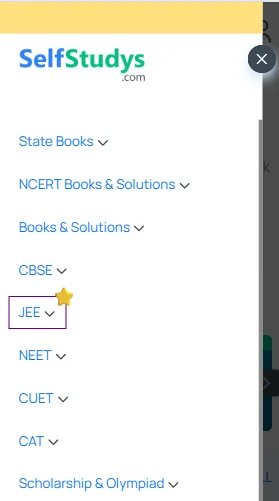
- A new drop-down menu will appear under this section. Here, you need to click on the ‘JEE flashcards’ icon.
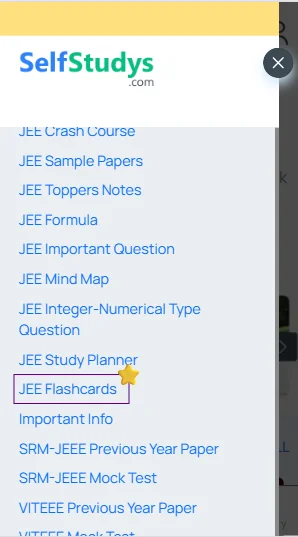
- Within a short interval, your screen will showcase the subject-wise flashcards for JEE.
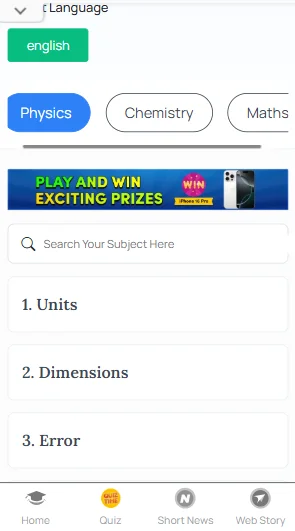
- You can select the subject for which you want to study the JEE flashcards PDF.
- Then, you can go through its list of various chapters and choose any for the JEE flashcards PDF free download.
- Finally, the PDF of your chosen chapters’ JEE flashcards will be displayed and you can either study it online or download the file.
Note: Google Log In or Sign Up is a step that you must complete to download the flashcards for JEE from our platform.
Why Should You Have Flashcards to Prepare for JEE?
JEE aspirants are usually overwhelmed with textbooks, revision notes, previous year papers, and mock tests. Not only is it about grasping the ideas; rather, it's highly different and more challenging. Flashcards are one of the more efficient study tools due to these reasons:
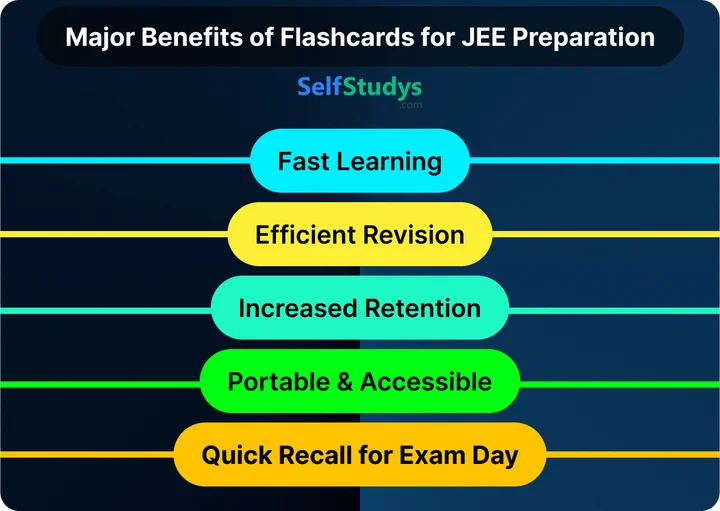
- Short and Focused Learning: Instead of reading long explanations, you can quickly learn the key points from JEE flashcards. A well-structured flashcard for JEE can help you with more focused learning.
- Faster Revision: You can go through the important formulas, theorems, and definitions in a few minutes. The flashcards for JEE are designed to enable you to easily grab the information.
- Easy to Carry: Whether you use the PDF or physical form, flashcards for JEE can be carried anywhere and make revision so easy.
- Memory Retention Enhanced: JEE Flashcards PDF is based on two excellent theories: active recall and spaced repetition, which increase the chances of long-term memory retention.
How JEE Flashcards Improve Memory Retention?
The success of flashcards lies in two fundamental learning approaches:
- Active Recall: Instead of passively reading notes, flashcards for JEE force you to recall information actively. This consolidates neural connections and enhances retention.
- Spaced Repetition: By repeating flashcards at spaced intervals, you retain learning over time, minimising chances of forgetting important concepts before the exam. The spaced repetition method also lessens the burden of covering huge chunks of information at once because it enables you to go through the resources most frequently.
The Role of Flashcards in JEE Exam Preparation
The JEE flashcards affect the entrance exam preparation majorly from the revision perspective. Below are the key roles of flashcards in JEE main entrance test preparation:
- Always Available: JEE flashcards PDFs are readily available and can be accessed on a phone, tablet, or computer at any time. The availability of flashcards on a fingertip 24×7 enables an aspirant to maintain consistency in their revision or study even during travel or daily commute.
- Structured: At Selfstudys, flashcards for JEE are organised in subject-wise and topic-wise folders, which helps candidates save hours when finding the right topic to revise.
- Flexible: Flashcards are flexible in various ways, whether it is about carrying them with you or making certain changes to them. The engineering aspirants can highlight and edit sections in PDF to suit their needs.
5 Tips to Create Custom Flashcards for JEE
If you are someone who prefers to make their own flashcards for JEE exam preparation, than here are five tips our subject experts and designer have shared:
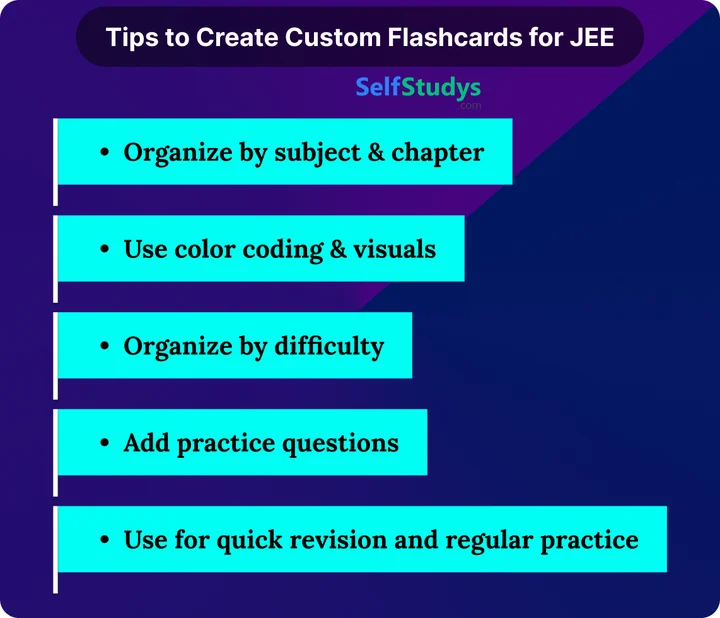
- Organise your JEE flashcards for maximum effectiveness: Maintain different flashcards for each subject — Physics, Chemistry, and Maths. It is crucial to have organised and structured flashcards for easy navigation. To do this, group your flashcards by topic or chapter to make it easier to review specific areas.
- Use colour coding, different visuals and diagrams: For easy identification of various parts of flashcards, use colours for formulas, definitions, and key concepts. To make it more engaging, include diagrams, flowcharts, and images wherever relevant to illustrate concepts. Adding visuals will also significantly improve memory retention.
- Organise by difficulty: Label JEE flashcards as basic, intermediate, and advanced to prioritise your learning. It will help you track progress and assist you in focusing on challenging JEE concepts.
- Include practice questions: Add a few relevant practice questions on each JEE flashcard to test your understanding of the concept. It will help you find areas where you need to pay more attention during revision.
In case you find creating and designing custom flashcards for the JEE exam a tedious or time-consuming process, feel free to use the JEE flashcards PDF free download links available on this page.
JEE Flashcards vs. Traditional Notes: Which is Better?
Although both — JEE flashcards and JEE revision notes are ideal for revision purposes, there are certain differences you should know before making a final decision.
| FEATURE |
JEE FLASHCARDS PDF |
TRADITIONAL NOTES (Hardcopy) |
|---|---|---|
|
Memorization |
Idea for quick recall |
Requires passive reading |
|
Portability |
Easy to carry |
Bulky and unorganized |
|
Engagement |
Interactive and fun |
Requires active effort |
|
Revision Speed |
Fast |
Time consuming |
Tips To Utilise Flashcards for JEE Aspirants
The tips below will help you stay consistent with revision and use the JEE flashcards for your leverage.
- Allocate 15-30 minutes of daily time to JEE flashcard revision.
- Utilise flashcards with JEE mock tests to reinforce revision.
- Utilise peer study groups for flashcard quizzes.
- Discuss the wrong answers to reinforce weak areas.
- Utilise flashcard marathons for quick revision of high-yield areas.
Conclusion
JEE preparation is a tough process that needs intelligent studying methods, and flashcards for JEE have emerged as one of the top tools to memorize concepts, formulas, and problem-solving skills. Through JEE flashcards in your daily revision procedures, you will be able to memorize better, remember quicker, and learn more interactively and interestingly. Flashcards are not just a study tool; they are a game-changer for JEE aspirants. If used properly, they can transform the way you learn, revise, and absorb information.







 Profile
Profile Signout
Signout










 Quiz
Quiz
 Get latest Exam Updates
Get latest Exam Updates 










